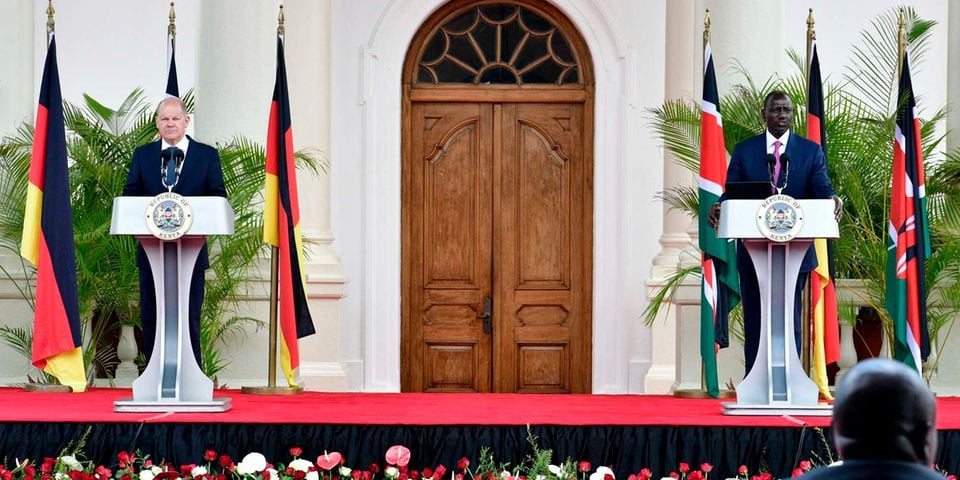A deal in the works between Kenya and Germany could see Berlin open its doors for Kenyans to take up some of the 250,000 jobs slots available to meet the European nation’s huge labour needs, President William Ruto announced yesterday.
President Ruto was speaking from State House, Nairobi during a joint press conference with German Chancellor Olaf Scholz.
The European country will absorb more professional, skilled and semi-skilled Kenyans under the agreement. To enable this, Nairobi urged Berlin to review and ease immigration laws to enable Kenyans find employment in Germany.
Further, they agreed to establish a twin institutions’ framework for pairing Kenyan technical and vocational training (TVET) colleges with selected TVET colleges in Germany, with the goal of facilitating the labour migration from Kenya to Germany upon graduation.
“We have agreed to establish a technical team from my office and the ministries of Foreign Affairs and Labour in both countries, to initiate discussions, expeditiously navigate the procedures and formulate an appropriate framework for the export of labour to Germany,” Dr Ruto said.
The Head of State observed that the two countries had deep historical ties dating back to 1963. Upon attainment of independence, Germany, President Ruto said, was the first state to recognise “our newly-born nation.”
That marked the beginning of a deep friendship that has grown stronger every passing year, with the common values and cooperation in diverse spheres of endeavour being the fabric holding the ties together, he said.
Germany offered to support, expand and upgrade TVET institutions and centres of excellence in the country from three to seven under a programme that will see more Kenyan youth benefit, and alleviate joblessness.
“To bridge the language gap, we agreed to introduce the teaching and learning of German in basic education institutions, TVETs and other institutions of higher learning.
Germany agreed to support us in training teachers,” Dr Ruto said, adding that the two countries agreed on the need to align, as much as possible, the Kenyan and German TVET curricula.
In East Africa, Kenya is Germany’s most important trading partner. However, the President decried the fact that the trade balance was in favour of Germany.
He said Kenya’s exports to Germany in 2021 were worth only $130 million, while imports amounted to $392 million.
“I have therefore called on the Chancellor to review tariff barriers and allow Kenyan products to enter Germany as well as the European market,” President Ruto said.
Kenya also urged Germany to support its efforts to conclude negotiation of the Economic Partnership Agreement between the East African Community and the European Union. The two leaders also agreed on the need for the world to work together to mitigate the effects of climate change.
President Ruto said the discussions in this critical matter must not be limited to “adaptation, loss and damage. Indeed, they must include climate financing, climate trading and climate investment”.
To ensure that Africa’s voice on the climate issue is heard loud and clear, President Ruto revealed that Nairobi will host the African Climate Action Summit in September.
“This will enable the continent’s leaders and experts to consolidate Africa’s position ahead of COP28,” he said. In response, Chancellor Scholz committed to extend financial and technical support to the summit.
Germany and Kenya also discussed regional peace and security, sharing concerns over what they termed “the unfortunate events in Sudan” and the spillover effects to the region.
While lobbying for international support, President Ruto said Kenya had repeatedly called for the end to the conflict and a return to the path of peaceful resolution through dialogue.
“We underscored the need for the international community to support Kenya, IGAD and the Africa Union in ongoing efforts to resolve the conflict,” the President said.
“We agreed on the immediate need for unconditional cessation of hostilities, humanitarian aid access and protection of civilians.
“On Ukraine, Kenya has consistently underscored the principles of the United Nations Charter which call for respect for territorial integrity, sovereignty and peaceful resolution of disputes.”
The bilateral meeting also saw the two states agree to explore a new phase that will be anchored on a strategic bilateral partnership framework in a plan that will strengthen and solidify Kenya’s relations with Germany. By Daniel Ogetta, NMG






